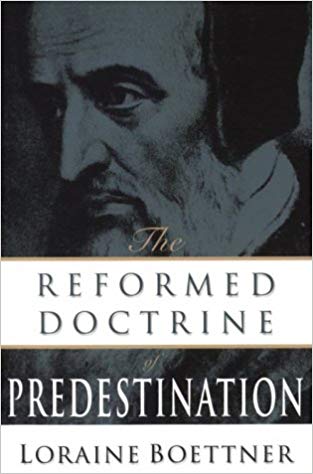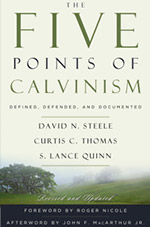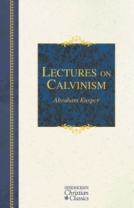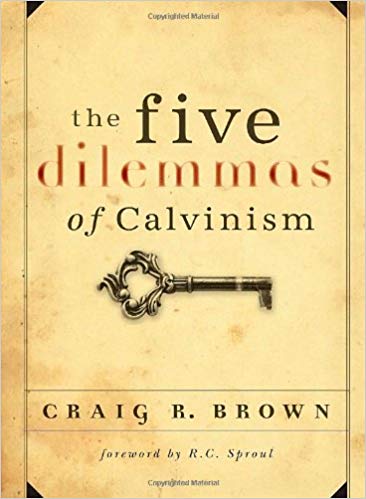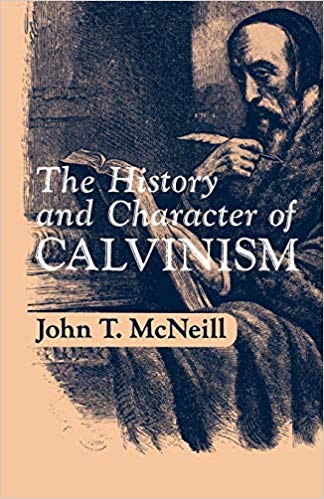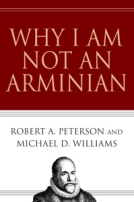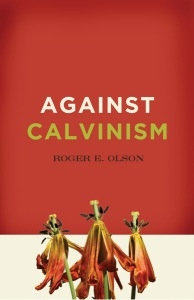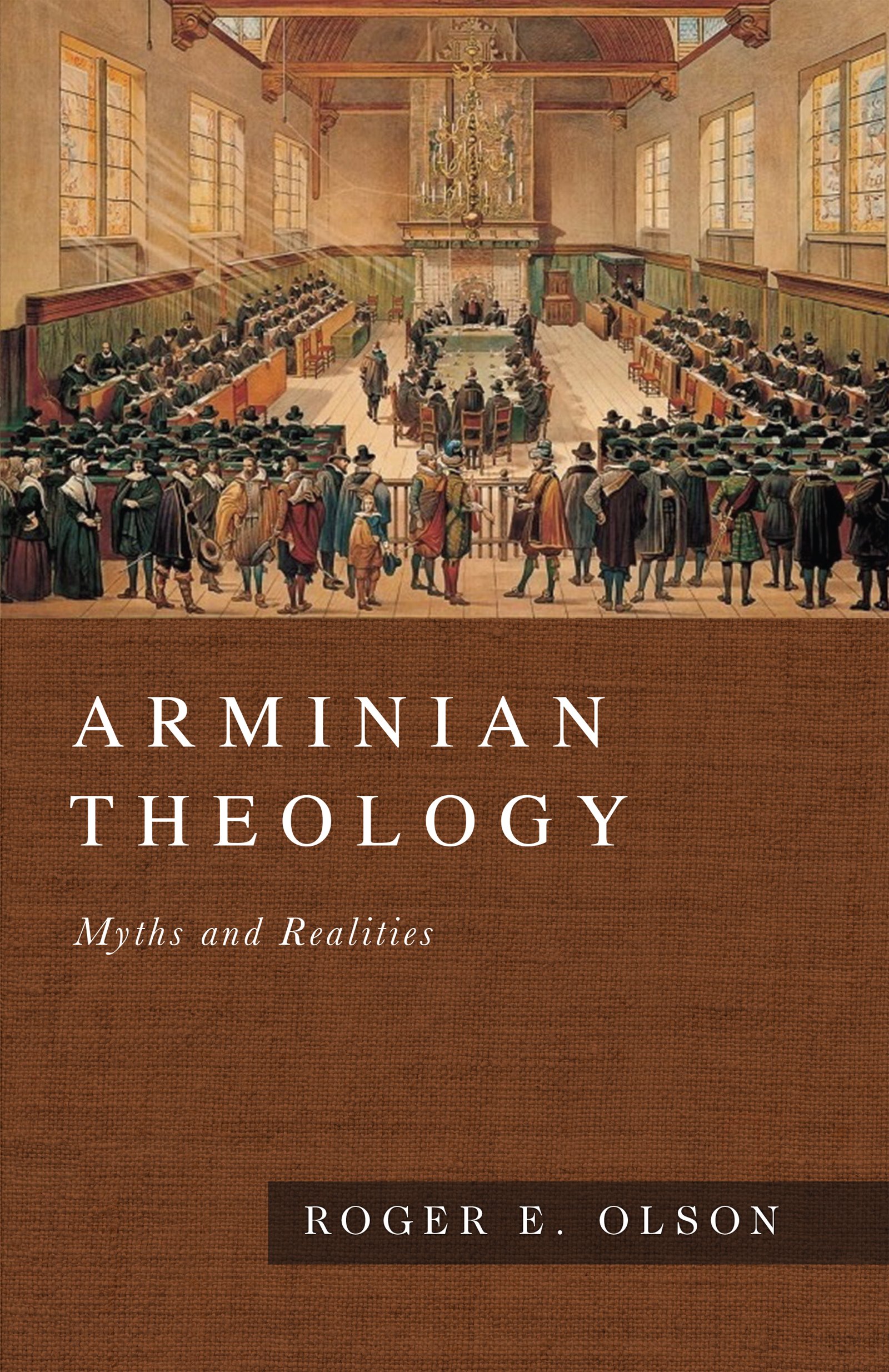PREFACE
The apostle Paul exhorts us, ‘He that glorieth, let him glory in the Lord.’ (I Cor. 1:31). This is the fundamental duty of every man. We are to glory in God, not in ourselves. Man is prone by nature to boast of his power and ability, and of his works and will; but he must not. For we have nothing of which to boast. Of ourselves, we are nothing and even less than nothing (Isa. 40:17). All that we are is given to us of God. ‘He (God) giveth to all life, and breath, and all things… In him we live, and move, and have our being…’ (Acts 17:25, 28). If we are to glory, we must glory in God’s greatness and power, in God’s works and ways. We are admonished, ‘Sing unto him (God), sing psalms unto him: talk ye of all his wondrous works.’ (Ps. 105:2).
It is our calling to glory especially in God’s wondrous work of salvation. With the Psalmist we must sing, ‘Bless the Lord, O my soul, and forget not all his benefits: Who forgiveth all thine iniquities; who healeth all thy diseases; Who redeemeth thy life from destruction; who crowneth thee with lovingkindness and tender mercies…’ (Ps. 103: 2-4). For we contribute absolutely nothing to salvation. It is all the wondrous work of God. He is the Sovereign Savior. Before the foundation of the world He planned salvation. He actually obtained salvation by sending His Son to die on the cross. By His grace He alone applies salvation to the heart and life of His people. Thus, from beginning to end ‘salvation is of the Lord’ (Jonah 2:9). All the glory is God’s.
It is our prayer that the Lord God will be pleased to use this pamphlet as a testimony of His sovereign grace, for the advancement of the cause of His Truth, and to the glory of His great name. ‘Be thou exalted, O God, above the heavens; let thy glory be above all the earth.’ (Ps. 57:5).
Rev. Steven R. Houck
THE SOVEREIGN GOD
The Scriptures teach us that God is absolutely sovereign. As the Almighty God, He rules the world. He is the King of kings, the Lord of lords, the Most High God. To Him belongs all power and all authority to do what He pleases in heaven above and in the earth beneath. This world and all that is within it is His world. Every creature is bound by His sovereign will and power. This King David recognized when he blessed the Lord with the words, ‘Thine, O Lord is the greatness, and the power, and the glory, and the victory, and the majesty: for all that is in the heaven and in the earth is thine; thine is the kingdom, O Lord, and thou art exalted as head above all.’ (I Chronicles 29:11).
Indeed the Lord is ‘head above all.’ There is no creature, whether it be beast, man, or angel, that can frustrate God’s sovereign rule. Nebuchadnezzar was absolutely right when he confessed, ‘I blessed the most High, and I praised and honoured him that liveth for ever, whose dominion is an everlasting dominion, and his kingdom is from generation to generation: And all the inhabitants of the earth are reputed as nothing: and he doeth according to his will in the army of heaven, and among the inhabitants of the earth: and none can stay his hand, or say unto him, What doest thou?’ (Daniel 4:34-35). There is no one who can ever stay the hand of God from doing what He wants; not among the army of heaven and not among the inhabitants of the earth. Though many raise the fist in defiance of God, though they despise His statutes and commandments, and though they rebel against Him with all the wickedness of their hearts; yet in it all God reigns supreme. ‘For the kingdom is the Lord’s and he is the governor among the nations.’ (Ps. 22:28).
How could it be any other way? For if God is GOD, then He must be sovereign over all. If He is all-powerful, then there can be no one else with power in himself to ever frustrate God’s power and dominion. He is God and He alone is God. Thus Moses instructed the people of Israel, ‘the Lord he is God in heaven above, and upon the earth beneath: there is none else’ (Deut. 4:39). For we are all ‘reputed as nothing.’ ‘All nations before him are as nothing; and they are counted to him less than nothing, and vanity.’ (Isa. 40:17). We are so insignificant in comparison to the Infinite God that we are nothing. We are less than nothing.
Surely then we may not ever say to God, ‘What doest thou?’ Surely we may not question anything He says or does. He is the Sovereign God and we are His finite creatures. He is the Potter and we are the clay. Thus we read, ‘Woe unto him that striveth with his Maker! Let the potsherd strive with the potsherds of the earth. Shall the clay say to him that fashioneth it, What makest thou? or thy work, He hath no hands?’ (Isa. 45:9). God has the right to do with us whatever He pleases and we may never complain or question. We must bow before Him in humble submission always. ‘For thus saith the high and lofty One that inhabiteth eternity, whose name is Holy; I dwell in the high and holy place, with him also that is of a contrite and humble spirit, to revive the spirit of the humble, and to revive the heart of the contrite ones.’ (Isa. 57:15).
GOD’S SOVEREIGN WILL
Because God is the sovereign God, the Master and Ruler of heaven and earth, it must also be true that the will of God is sovereign. If God is the King of all creation, then His decree and purpose must stand immovable. For it is impossible to conceive of a sovereign God whose will and purpose can be frustrated by those over whom He rules. If the will of the ruled can in any way change or thwart the will of the ruler, then the ruler is not sovereign. The sovereign God must also have a sovereign will. That is exactly what the Bible teaches us. The great God of heaven and earth does will what He pleases and then performs all that He has willed. For God Himself declares through the prophet Isaiah, ‘…I am God, and there is none like me, declaring the end from the beginning, and from ancient times the things that are not yet done, saying, My counsel shall stand, and I will do all my pleasure.’ (Isa. 46:9-10).
Indeed, there is none who is like God. For who can tell us the end of a thing at its beginning, even before it has begun to run its course? Who is able to declare the things that have not yet taken place, long before they ever become history? Surely only God can do that. For it is the very will and purpose of God that determines the existence and course of all things. His will is so sovereign that He has determined just exactly what comes to pass in this world. God has determined and appointed absolutely everything. Even the smallest details are comprehended in His will and purpose. Thus the apostle refers to Him as the God ‘Who worketh all things after the counsel of his own will.’ (Eph, 1:11). All things are what they are and do what they do because God so works in them. And He works in them in perfect harmony with what He has willed in His counsel. There is nothing that is outside the determinate counsel of God.
What is even more amazing is that this determination took place in eternity. God’s will and counsel is not bound to time, nor to anything in time. It is above time and history. It is as eternal as is God Himself, even as the apostle says, ‘according to the eternal purpose which he purposed in Christ Jesus our Lord.’ (Eph. 3:11). Long before there ever was a world, the course of history was set down and determined by the purpose of God in Christ Jesus. And so too His purpose will continue unbroken and unchanged for ever and ever. We even sing of this with the Psalmist, ‘The counsel of the Lord standeth for ever, the thoughts of his heart to all generations.’ (Ps. 33:11).
Can there be any doubt that the will of the sovereign God is always done? Since His counsel stands forever, to all generations, surely no one can ever frustrate God’s will. This is exactly the testimony of God Himself. We read, ‘The Lord of hosts hath sworn, saying, Surely as I have thought, so shall it come to pass: as I have purposed, so shall it stand…For the Lord of hosts hath purposed, and who shall disannul it? and his hand is stretched out, and who shall turn it back?’ (Isa. 14:24,27). God’s will is sovereign. No one can disannul what God has purposed-not even wicked man who actively seeks to bring to nothing the good-pleasure of the Lord by his disobedience and rebellion. Men may devise all kinds of schemes to overthrow the Most High; but God is so sovereign, that He accomplishes His will even in and through all their devices. ‘There are many devices in a man’s heart; nevertheless the counsel of the Lord, that shall stand.’ (Prov. 19:21). His counsel shall stand and He will do all His pleasure. The Lord God has spoken; He will also bring it to pass (Isa. 46:11). God is sovereign and that must mean that His will is also sovereign.
SOVEREIGN PREDESTINATION
Since God is the sovereign God, Whose counsel stands forever, Whose will can never be frustrated, and Whose purpose is not disannulled, we must conclude that His will and determination is sovereign particularly in salvation. It can not be that man is the one who determines, by his own will, whether or not he will be saved. Certainly man must come to God by faith for salvation. Surely, he must seek God, love Him, and serve Him out of a willing heart. But ultimately, since God is sovereign, salvation must depend solely upon His sovereign choice. For He is the infinite Creator Who has the right and the power to do with His finite creatures exactly what He pleases-even with respect to our eternal destiny. Thus the apostle Paul asks, ‘Hath not the potter power over the clay, of the same lump to make one vessel unto honour, and another unto dishonour? What if God, willing to shew his wrath, and to make his power known, endured with much longsuffering the vessels of wrath fitted to destruction: And that he might make known the riches of his glory on the vessels of mercy, which he hath afore prepared unto glory?’ (Rom. 9:21-23). God is the sovereign Potter and we, His creatures, are the clay. Just as an earthly potter has sovereign power over the clay, to make it into whatever he pleases, so God sovereignly makes us into whatever He pleases.
He makes some to be ‘vessels of mercy’ which He has ‘afore prepared unto glory.’ These are God’s elect people, those chosen by Him to salvation in Christ. Of these people the apostle says, ‘But we are bound to give thanks to God for you, brethren beloved of the Lord, because God hath from the beginning chosen you to salvation…’ (II Thess. 2:13). Before the world was created, God in His eternal decree and counsel selected certain ones to be His special people. The Psalmist says, ‘Blessed is the nation whose God is the Lord; and the people whom he hath chosen for his own inheritance.’ (Ps. 33:12). To these chosen people God, in His mercy, grants faith and repentance, and all the blessings of salvation, so that they are called ‘vessels of mercy.’ Thus we read, ‘Blessed be the God and Father of our Lord Jesus Christ, who hath blessed us with all spiritual blessings in heavenly places in Christ: According as he hath chosen us in him before the foundation of the world…’ (Eph. 1:3-4). Oh indeed, we choose God, but only after He has chosen us and grants unto us the power to choose Him. Jesus said, ‘Ye have not chosen me, but I have chosen you…’ (John 15:16).
The apostle Paul also refers to ‘vessels of wrath fitted to destruction.’ For since God is sovereign, His will must not only be the determining factor in salvation, but also in everlasting destruction. God not only selects some to be saved and glorified, but He also appoints others to ‘destruction.’ Jude refers to these people when he speaks of ‘certain men crept in unawares, who were of old ordained to this condemnation…’ ( Jude 4). The apostle Peter refers to them as ‘being disobedient: whereunto also they were appointed’ (I Peter 2:7-8). To these people God does not grant faith and repentance, so that they continue in their sin and wickedness. He looks upon them, not in love, but in His wrath. Thus they are referred to as, ‘the vessels of wrath.’
No wonder the Scriptures declare, ‘So then it is not of him that willeth, nor of him that runneth, but of God that sheweth mercy.’ (Rom. 9:16). Salvation can never be based upon either our works or our will. If we trust Christ as our Savior and have the hope of glory within us, it is because of but one thing-God’s sovereign will and good-pleasure which appointed us to glory. For our God is the God, ‘Who hath saved us, and called us with an holy calling, not according to our works, but according to his own purpose and grace, which was given us in Christ Jesus before the world began.’ (II Tim. 1:9). ‘His own purpose and grace’ is nothing less than His gracious decree of election which is the fountain of every saving good.
FOREKNOWLEDGE
Since God sovereignly predestinated the life of every man (some to glory and others to destruction), it can not be that God’s predestination is based upon man’s choice-his faith and repentance. It can not be that God, in His foreknowledge, simply looked down into history and saw all those who would believe and then, based upon that knowledge, chose them to salvation and glory. For that would make man’s choice sovereign rather than God’s choice. That would make God’s predestination depend upon man’s will. The Scriptures, however, teach that election has nothing to do with man’s works. In connection with the election of Jacob and the reprobation of Esau, we read in Rom. 9:11, ‘For the children being not yet born, neither having done any good or evil, that the purpose of God according to election might stand, not of works, but of him that calleth.’ Predestination, since it is based upon God’s purpose, can not be based upon man’s work-not his good nor his evil, not his faith nor his unbelief. Both election and reprobation are unconditional. Predestination is the sovereign and free choice of God alone.
In fact, God’s foreknowledge is not a fore-seeing of future events. It has nothing to do with looking into the history of man and seeing what he will or will not do. Romans 8:29-30 makes that very clear. We read, ‘For whom he did foreknow, he also did predestinate to be conformed to the image of his Son…Moreover whom he did predestinate, them he also called: and whom he called, them he also justified: and whom he justified, them he also glorified.’ Notice that in these verses there is an unbroken chain of events which God performs. He foreknew certain ones, and those same people He also predestinated, called, justified, and glorified. The ones whom He foreknew are the ones whom He saves and brings to eternal glory. Foreknowledge, then, can not refer to a certain intellectual knowledge of all men. For all men are not saved and glorified. Rather it refers to God’s knowledge of His own chosen people, who alone are saved and glorified.
But this foreknowledge of God’s chosen people is not a mere intellectual knowledge either. The Scriptures teach us that it is a very intimate knowledge of love. When God foreknows His chosen people then He loves them. He loved them before they were born. Thus we read in Amos 3:2, ‘You only have I known of all the families of the earth…’ Surely, as the all-knowing One, God intellectually knows all the families of the earth. But He knows only His chosen people (the family of God) in love. Christ expressed exactly the same thing when He said, ‘I am the good shepherd, and know my sheep and am known of mine…I lay down my life for the sheep.’ (John 10:14-15). While the hireling intellectually knows the sheep, he does not love them. Therefore, when the wolf comes he flees. But, Christ Who knows His elect people in love, lays down His life for the sheep. God’s foreknowledge, then, is His eternal love for His chosen people.
It is this eternal knowledge of love which is the basis of election. God did not choose anyone to salvation and glory because He saw beforehand that they would believe and repent of their sins. He sovereignly chose them because He sovereignly loved them in Christ Jesus. If we go back to that unbreakable chain in Rom. 8:29-30, then we see that ‘did foreknow’ is first before ‘did predestinate.’ God’s people are saved and glorified because they have been predestinated to that end by God, and they are predestinated to that end because they have been loved of God from all eternity. Thus we read, ‘The Lord did not set his love upon you, nor choose you, because ye were more in number than any people; for ye were the fewest of all people. But because the Lord loved you… hath the Lord brought you out with a mighty hand, and redeemed you…’ (Deut. 7:7-8). It is unconditional election that is behind salvation. It is God’s sovereign and eternal love (foreknowledge) that is behind election.
GOD’S SOVEREIGN LOVE
Since God is sovereign in predestination and since that predestination is based upon God’s intimate knowledge of love (foreknowledge), it must also be true that God’s love is sovereign. His love is so vitally connected to Divine election, that it must be just as sovereign as is the electing will of God, just as sovereign as is God Himself. God’s love can not be some powerless emotion that would like to see all men saved, but does not have the strength to accomplish that desire. God’s love must be an effectual power that not only wills the salvation of its objects (election), but actually does save them.
Indeed, the Scriptures teach us that God’s love is such a sovereign power that it is always a saving love. It is impossible for God’s love not to save its blessed objects. We read the words of God Himself, ‘I have loved thee with an everlasting love: therefore with lovingkindness have I drawn thee.’ (Jer. 31:3). God’s love does not sit around watching its objects go to hell and do nothing about it. If God loves you, then He saves you. His everlasting love is a mighty sovereign power that always draws its objects unto Him. ‘Therefore,’ He says. Because He loves His people, He must effectually draw them out of their sin and death and into the glory of His everlasting salvation. His sovereign love will not allow His people to be damned. There are no objects of His love in hell at the present time, nor shall there ever be any there. How cruel would His love be if it did not will to save its objects from hell, and how weak if it could not save from hell.
Such a cruel, weak love is not God’s love. The apostle Paul says, ‘But God, who is rich in mercy, for his great love wherewith he loved us, even when we were dead in sins, hath quickened us together with Christ…’ (Eph. 2:4-5). God quickens His people, makes them spiritually alive by the mighty power of His mercy and grace. But why? Why does God give life to them rather than let them rot in the pit of hell? For but one reason-He loves His people. His love is not some weak impotent thing that cries over the lost sinners in hell because it can do nothing to help. God’s love delivers the sinner from the destruction of hell.
The apostle John agrees. For he declares, ‘Behold what manner of love the Father hath bestowed upon us, that we should be called the sons of God…’ (I John 3:1). Look at the love of God. Look at its nature. It is such a sovereign wonder that it makes it possible for the elect to be called the sons of God. Those who are by nature the children of wrath can be called the children of God because God so loves. The sovereign effectual power of God’s love actually makes them His children. In His love He delivers them even as He did Israel of old. ‘When Israel was a child, then I loved him, and called my son out of Egypt.’ (Hosea 11:1).
Thus it can not be that God loves everyone. Since God’s love is sovereign and therefore always a saving love, only those who experience the salvation of the Lord can be the objects of His love. God loves His elect people, whom He has chosen to salvation, but His eternal hatred and wrath abides upon the reprobate sinner. The Psalmist declares, ‘The Lord trieth the righteous: but the wicked and him that loveth violence his soul hateth.’ (Ps. 11:5). The Lord hates not only the sins of the wicked, but the wicked themselves. ‘The foolish shall not stand in thy sight: thou hatest all workers of iniquity.’ (Ps. 5:5). His wrath, not His love, abides upon them forever (Ps. 7:11, John 3:36). Jacob, whom God chose in Christ before the foundation of the world, is the object of all God’s love. But Esau, whom God appointed to destruction, is eternally the object of His hatred. God said, ‘Jacob have I loved, but Esau have I hated.’ (Malachi 1:1-3, Rom. 9:13). Thus God does not save Esau, but leaves him in his sin, and to the torments of everlasting hell.
The man who goes to hell, then, does not go there in spite of God’s love. He goes there without God’s love. On the other hand the man who goes to heaven goes there, not because of his will or works, but because of the sovereign love of God which always saves. What a blessed comfort for the child of God. God’s love does not leave him in hell, but picks him up and delivers him from all his sin and death. His sovereign love will not allow him to see damnation. What a wonderful love! What an effectual power! God’s people, therefore, ought to rejoice in ‘God, even our Father, which hath loved us, and hath given us everlasting consolation and good hope through grace…’ (II Thess. 2:16). They must rejoice in God’s sovereign love.
GOD’S LOVE AND THE CROSS
Since God’s love is not some helpless emotion but an effectual power which always saves its objects, it follows that also Christ’s death on the cross is a sovereign power that actually accomplishes the salvation of God’s people. For the sovereign love of God is manifested in the cross of Christ. The sacrificial death of Christ is the demonstration of just how much God loves His people. In the cross we see the effectual love of God sovereignly working. Thus the apostle John writes, ‘In this was manifested the love of God toward us, because that God sent his only begotten Son into the world, that we might live through him.’ (I John 4:9).
If you want to behold the love of God in all of its wonder, then you must look at the cross. Think of it! God so loved His people that He gave His only begotten Son to die for them that they might live through Him. He sent His own Son, Who is in the very bosom of the Father, and Whom God loves with a perfect and infinite love. So great, so infinite, so wondrous is God’s love for His people that He gave Himself in His Son on the cross. For the apostle Paul says that the ‘church of God’ is the church ‘which he (God) hath purchased with his (God’s ) own blood.’ (Acts 20:28).
Surely then we must see that the death of Christ on the cross was a part of God’s eternal plan for the salvation of His people. The relationship between God’s love and the cross is so intimate, that it is impossible that the cross could be something incidental or accidental. The death of Christ did not just happen. The cross was not forced upon God by wicked men who set their hearts against the Lord and His Anointed. No, never! As the manifestation of God’s infinite love for His people, the cross is the very heart and core of God’s purpose of salvation. The cross is the sovereign means God uses to save His beloved people from hell. He deliberately purposed that Christ should be crucified and slain for their sins. Thus we read, ‘For of a truth against thy holy child Jesus, whom thou hast anointed, both Herod, and Pontius Pilate, with the Gentiles, and the people of Israel were gathered together, for to do whatsoever Thy hand and Thy counsel determined before to be done.’ (Acts 4:27-28).
Oh indeed, wicked men took Him and crucified Him, but it was all done according to the good and perfect will of God (Acts 2:23). The cross was no afterthought, no contingency, but a sovereign act of Almighty God Who does all of His good-pleasure. The cross was the perfect execution of God’s decree. Thus in Revelation 13:8 Christ is referred to as, ‘the Lamb slain from the foundation of the world.’ He is the Lamb slain for our salvation already in the eternal counsel of God.
That means that the cross is a power itself-the sovereign power of God. Since God, out of His great love, sent Christ to die for His people that through His death we might have life, that death must save and give life to all the objects of God’s love. The cross does not make salvation possible for all so that anyone can have it, if they will only take it. Christ’s death actually saves God’s elect people. ‘For the Son of man is come to seek and to save that which was lost.’ (Luke 19:10). In His death on the cross Christ did not merely make provision for salvation. He actually obtained salvation. Thus we read, ‘Neither by the blood of goats and calves, but by his own blood he entered in once into the holy place, having obtained eternal redemption for us.’ (Hebr. 9:12). It is the very power that saves. The apostle teaches that when he says, ‘But we preach Christ crucified, unto the Jews a stumblingblock, and unto the Greeks foolishness; but unto them which are called, both Jews and Greeks, Christ the power of God, and the wisdom of God.’ (I Cor. 1:23-24). Indeed, ‘Christ crucified’ is the ‘power of God’-the sovereign effectual power of God that does actually save His people from all sin. God loves His people, Christ has died for them, surely then, they will all be saved.
PARTICULAR REDEMPTION
Since the sovereign love of God is particular (only for the elect), and since the cross (the actual power of God which secures salvation) is the sovereign out-working of that love, of necessity the atonement of the cross must be limited to the beloved chosen people of God. The redemption which Christ merited on the cross is for a particular and definite group of people. It is limited to those whom God loves and whom He has chosen to salvation from before the foundation of the world. Christ did not die for everyone. He died for the elect of God and for them alone. Since God’s choice is sovereign and since His love is sovereign, that must be true. God does not have to provide for the salvation of all and then wait upon man to make the choice. If that were true, then He would not be sovereign. Unlimited atonement is inconsistent with the sovereignty of God. It makes man sovereign rather than God. But God is sovereign. He is sovereignly working out His plan of salvation. Therefore, He sent Christ to die, not for all, but for only those whom He intended to save.
This is exactly what Jesus Himself teaches us. He says, ‘I am the good shepherd and know my sheep, and am known of mine. As the Father knoweth me, even so know I the Father: and I lay down my life for the sheep.’ (John 10:14-15). Christ is the Good Shepherd and His people (whom He knows and who know Him) are His sheep. He lays down His life for the sheep. He did not die for all, for He makes it very clear that many are not His sheep. In verse 26 of the same chapter He says, ‘But ye believe not, because ye are not of my sheep…’ The wicked who know not Christ do not ever believe on Him because they are not His sheep (elect people). For them, Christ did not die. He died for the sheep alone.
According to the apostle Paul, the sheep constitute the church of Christ. He exhorts the elders of the church, ‘Take heed therefore unto yourselves, and to all the flock, over the which the Holy Ghost hath made you overseers, to feed the church of God, which he hath purchased with his own blood.’ (Acts 20:28). God in Christ has purchased the Church with His precious blood. He has not purchased all mankind, not the elect and the reprobate. He shed His blood to purchase redemption for His Church alone. This is very beautifully stated in Eph. 5. We read, ‘Husbands, love your wives, even as Christ also loved the Church, and gave himself for it.’ (Eph. 5:25). Christ loved His Church from before the foundation of the world and therefore He gave Himself, He gave His life on the cross, for her. Notice that we have the love of Christ and the cross of Christ connected in this passage. Just as Christ’s love is particular (only for the elect), so His atoning death is particular.
The limited scope of the atonement is confirmed by Romans 8 where we are told, in no uncertain terms, that Christ died for the elect. The Apostle says, ‘He that spared not his own Son, but delivered him up for us all, how shall he not with him also freely give us all things?’ (Rom. 8:32). And who are these people for whom Christ was delivered up? Who are the ‘us all’? We find the answer in verses 33 and 34, ‘Who shall lay any thing to the charge of God’s elect? It is God that justifieth. It is Christ that died, yea rather, that is risen again, who is even at the right hand of God, who also maketh intercession for us.’ They are God’s elect. God’s elect people never have to fear condemnation-not from Christ and not from God. For Christ died for them and by that death God justifies them. That is the power of the cross. The wicked who do not know this justification and who are condemned to hell forever, can not possibly be included in the atoning work of Christ on the cross. If they were, then there would be no grounds for their condemnation. Why should they be condemned on account of their sins, if Christ paid for those sins on the cross? No, Christ did not die for them. Christ died for God’s elect. Moreover, that work of the cross is so sovereign that nothing shall ever be able to condemn God’s people. Nothing shall ever be able to separate them from the love of God manifested in Christ on the cross (Rom. 8:35-39). Thus our Lord says, ‘And I give unto them eternal life; and they shall never perish, neither shall any man pluck them out of my hand.’ (John 10:28). Indeed, ‘He (Christ) shall see his seed (the elect)… He shall see of the travail of his soul, and shall be satisfied.’ (Isa. 53:10-11).
REGENERATION
God is sovereign. He is sovereign in all of His being. That means that His will is sovereign. It is so sovereign that He alone determines, by election and reprobation, the destiny of every man. The deciding factor in salvation is God’s will and not man’s will. Moreover, because God’s will is sovereign, so also is His love which stands behind sovereign election. It is so sovereign that those who are the objects of that blessed love are surely saved. The death of Christ, as the effectual working and manifestation of that love, actually secures the salvation of His chosen people.
Now, since all of this is true, it follows that the application of this salvation is also the sovereign work of God. Since God determines whom He will save, since He loves those chosen people and sends Christ to die to secure their salvation, He must also sovereignly work out that salvation in their hearts and lives. It is inconceivable that God would sovereignly plan our salvation, objectively obtain that salvation through the foreordained death of His only begotten Son, and then leave it up to man to appropriate that salvation in and of himself. No, since God planned it, He alone carries out that plan. He sovereignly applies salvation to the elect sinner.
We see this to be true already in the very first act of salvation which God performs within the sinner, chosen and loved by Him. Regeneration, the new birth, is not man’s work, but the sovereign work of the Almighty. Regeneration is the mighty work of the sovereign God by which He, apart from any will or work of man, gives life to the chosen but spiritually dead sinner. Thus we read in Eph. 2:4-6, ‘But God, who is rich in mercy, for his great love wherewith he loved us, even when we were dead in sins, hath quickened us together with Christ, (by grace ye are saved;) and hath raised us up together, and made us sit together in heavenly places in Christ Jesus.’ By nature we are spiritually dead, but in regeneration God makes alive. Regeneration is a spiritual resurrection from spiritual death. God gives life to those who were before absolutely devoid of life-‘dead in sins.’ Just as the resurrection of the body is a mighty act of God, so too regeneration, as a spiritual resurrection, can only take place by the wondrous and powerful working of God’s sovereign grace. A corpse rotting in the grave can not raise itself, for there is no life in it. It is impossible for a physically dead man to do anything. Neither can the spiritually dead do anything to contribute to their regeneration.
This is further demonstrated by the fact that regeneration is nothing less than the implantation of a new heart. In the prophecy of Ezekiel we read, ‘A new heart also will I give you, and a new spirit will I put within you: and I will take away the stony heart out of your flesh, and I will give you an heart of flesh.’ (Ezek. 36:26). By nature, the dead sinner has a heart that is as hard as a rock. It is not receptive to God’s Word. It does not love God nor does it seek to walk in God’s commandments. But in regeneration God sovereignly takes out that heart of stone and He gives, instead, a heart of flesh, a heart that is soft and receptive. As the Great Physician, He implants within the elect sinner, by His Spirit, a heart that loves Him and seeks to be obedient to all His statutes. Apart from that new heart it is impossible for the sinner to turn from his sins and, by faith, seek the true and living God.
Regeneration, therefore, can not possibly be conditioned upon man’s will or work. It can not be that faith and repentance precede regeneration and thus are conditions which must be met before God can regenerate us. Both faith and repentance are impossible apart from the new birth. If a man has faith it is because God has already regenerated him. Faith is the fruit of regeneration and not the other way around. The apostle John describes born-again believers as those ‘which were born, not of blood, nor of the will of the flesh, nor of the will of man, but of God.’ (John 1:13). Does a newborn babe help his mother bring himself forth in birth? Or does he contribute in any way to his own conception? Of course not. Neither does man contribute to the new birth which God gives. Paul instructs us, ‘Not by works of righteousness which we have done, but according to his mercy he saved us, by the washing of regeneration, and renewing of the Holy Ghost.’ (Titus 3:5). A man is born into the family of God by a sovereign act of God alone.
The new life of regeneration does not have its origin in blood (physical descent), nor does it have its origin in the will of the flesh (the natural desires of the body). In fact, this life can not be attributed to the will of man at all. It has its origin in God alone. Regeneration is never the result of man’s choice. Indeed, it is true that, ‘Except a man be born again, he cannot see the kingdom of God.’ (John 3:3). But how is it that a man is born again? The apostle Peter says that it is ‘God’ Who ‘hath begotten us again unto a lively hope by the resurrection of Jesus Christ from the dead.’ (I Peter 1:3). God’s people are regenerated by the powerful and living word of God. ‘Being born again, not of corruptible seed, but of incorruptible, by the word of God, which liveth and abideth for ever.’ (I Peter 1:23). Regeneration is the sovereign work of God. He alone can give life everlasting to the dead by His living word.
MAN’S DEPRAVITY
The necessity of God’s sovereignty in regeneration (and in all of salvation) is especially demonstrated by the utter depravity of man. Man is absolutely incapable of saving himself. He has neither the will nor the power to change his wicked heart. Thus the prophet asks, ‘Can the Ethiopian change his skin, or the leopard his spots? Then may ye also do good, that are accustomed to do evil.’ (Jer. 13:23). Just as the Ethiopian cannot possibly change the color of his black skin, just as the leopard cannot possibly remove the blackness of his spots, so too man cannot possibly change the wicked character of his heart and will and mind. Man is born into this world with a wicked heart and a corrupt nature. Without the sovereign work of God, that heart and nature can never be made white and good, clean and pure, righteous in God’s sight.
Moreover, the depravity of man’s nature is total. It not only extends to the whole of his being but it makes him totally incapable of any good. Thus the apostle writes, ‘As it is written, There is none righteous, no, not one: There is none that understandeth, there is none that seeketh after God. They are all gone out of the way, they are together become unprofitable; there is none that doeth good, no, not one.’ (Rom. 3:10-12). Many times it may appear to us that the natural man performs some good. But the judgment of God is clear: ‘There is none that doeth good, no, not one.’ It is utterly impossible for the natural man to do anything good. The natural man cannot and does not even seek God.
Rather, he is a rebel who opposes God and the kingdom of God. He is a slave to sin who can do nothing but sin. He is blind in his understanding and perverse in his judgments. In all of his ways he imitates his spiritual father, the devil. Even his will is enslaved to the will of Satan. This Jesus teaches us when He says, ‘Ye are of your father the devil, and the lusts of your father ye will do (literally-‘ye will to do’).’ (John 8:44). Thus the natural man actually hates God and His anointed Son. He is so far from willing and seeking salvation in the only true God that he loves darkness rather than light. ‘And this is the condemnation, that light is come into the world, and men loved darkness rather than light, because their deeds were evil. For every one that doeth evil hateth the light, neither cometh to the light, lest his deeds should be reproved.’ (John 3:19-20). Indeed, as the Scriptures teach us, the natural man is ‘dead in his sins and the uncircumcision of his flesh.’ (Col. 2:13).
This corruption of our nature we inherit from our fathers. As a result of his sin, Adam’s nature became wicked, and that wickedness is passed on from one generation to another. We are born sinners. We are corrupt in nature, even before we commit any personal sins. We must all say with David, ‘Behold, I was shapen in iniquity; and in sin did my mother conceive me.’ (Ps. 51:5). In fact, even apart from our corrupt natures, we are guilty sinners because God reckons us guilty of Adam’s first sin in paradise. Thus the apostle Paul says, ‘Wherefore, as by one man sin entered into the world, and death by sin; and so death passed upon all men for that all have sinned.’ (Rom. 5:12). The sin of our father Adam is imputed to us. We are as guilty of eating the forbidden fruit as he is. This is our condition and state by nature.
Therefore, how is it possible for man to contribute to his regeneration by either his will or works? Apart from God’s sovereign grace we are guilty, corrupt sinners who can not and will not change our hard hearts. Apart from God our will and works only contribute more to our debt. Apart from God, we are children of the devil who deserve to be condemned together with him and his evil angels. Apart from God we can do nothing that is pleasing in His sight. Apart from God salvation is impossible. We are like dry bones in the midst of a valley-bones that do not and can not live, bones with no flesh upon them, bones without the breath of life. Yet all of God’s people do live because God, in His regenerating grace, sovereignly gives to them that life. He says to them, ‘O ye dry bones, hear the word of the Lord. Thus saith the Lord God unto these bones; Behold, I will cause breath to enter into you and ye shall live: And I will lay sinews upon you, and will bring up flesh upon you, and cover you with skin, and put breath in you, and ye shall live; and ye shall know that I am the Lord.’ (Ezek. 37:4-6). What sinners can not do, God does.
THE SAVING CALL
When God imparts His regenerating grace to a man, that man is sovereignly changed in the depth of his being. He who was once spiritually dead is raised from the dead. He is born again from above. He who once could not even ‘see the kingdom of God’ (John 3:3) is given eyes to see, ears to hear, and a heart to understand the things of God and His kingdom. In regeneration God imparts the spiritual power that enables a man to seek, to know, and to embrace Christ and all His benefits.
That does not mean, however, that man is finally on his own, that he does not need God anymore. Salvation is so totally in God’s hands that even after regeneration a man does not come to faith and repentance without a further work of God. If the elect, regenerated sinner is to come to conversion and to the consciousness of his salvation, God must sovereignly and savingly call Him to such spiritual activity that his eyes do see, his ears do hear, and his heart does understand the things of God.
Thus the apostle teaches us that the saving call of God is an essential link in the unbreakable chain of salvation. He says, ‘Moreover whom he did predestinate, them he also called: and whom he called, them he also justified: and whom he justified, them he also glorified.’ (Rom. 8:30). Just as surely as a man must be predestinated to be saved, so too he must be called. For God’s people are those who ‘shew forth the praises of him who hath called you out of darkness into his marvelous light.’ (I Pet. 2:9). Every true child of God has been called out of the darkness of sin and death into the glorious light of God’s salvation.
Without this saving call of God it is utterly impossible for anyone to call upon Him for salvation. For it is not man’s calling on God that is first in salvation, but God’s call to man. Indeed, man must call upon God for salvation. The apostle says, ‘For whosoever shall call upon the name of the Lord shall be saved.’ (Rom. 10:13). The apostle, however, goes on to ask, ‘How shall they call on him in whom they have not believed? and how shall they believe in him whom (literally) they have not heard? and how shall they hear without a preacher?’ (Rom. 10:14). If the elect sinner is to be saved, he must call upon God. He does that, however, only by faith in Jesus Christ. He must believe first. Without faith it is impossible to call upon God. But that faith in Christ comes only by the way of hearing the call of Christ. The elect, regenerated sinner must hear Christ’s voice call him out of darkness into the marvelous light. Christ, as the Good Shepherd of His sheep, calls His people to Himself. He says that ‘he calleth his own sheep by name, and leadeth them out.’ (John 10:3). Christ Himself speaks to His people and calls forth faith and repentance from their regenerated hearts.
This call of God in Christ to His elect people is a powerful, efficacious call that can not be resisted. It is an internal call which is directed to the regenerated heart and which always brings forth fruit. They hear the living Word of the Living God and that Word does exactly what God wants it to do. Thus God says, ‘So shall my word be that goeth forth out of my mouth: it shall not return unto me void, but it shall accomplish that which I please, and it shall prosper in the thing whereto I sent it.’ (Isa. 55:11). When Christ calls the sheep they hear His voice, and as a result of the mighty working of that Divine Word, in faith they follow their Shepherd. Jesus says, ‘My sheep hear my voice, and I know them, and they follow me.’ (John 10:27).
The irresistible call of God, moreover, comes through the external preaching of the gospel. The concluding question of Romans 10:14 is, ‘and how shall they hear without a preacher?’ The regenerated sinner does not hear Christ’s call except through the preaching of the gospel. The regenerated sinner’s response of faith, repentance, obedience, and love is always a response to the call of the gospel. Thus the apostle can exclaim, ‘But we are bound to give thanks always to God for you, brethren beloved of the Lord, because God hath from the beginning chosen you to salvation through sanctification of the Spirit and belief of the truth: Whereunto he called you by our gospel, to the obtaining of the glory of our Lord Jesus Christ.’ (II Thess. 2:13-14).
That, however does not mean that this call is somehow man’s work. The preacher brings God’s Word which so touches the regenerated heart that there comes forth faith and repentance, and yet it is not the preacher’s work nor the work of the regenerated sinner. It is all God’s work. It is God’s sovereign call. For God is the God ‘Who hath saved us, and called us with an holy calling, not according to our works, but according to his own purpose and grace, which was given us in Christ Jesus before the world began.’ (II Tim. 1:9). Man does not first call upon God, but God calls man. Not because of anything man is or does, but in perfect harmony with His predestinating purpose and abounding grace. He, through the preaching, sovereignly calls to His elect people, ‘Come unto me, all ye that labor and are heavy laden and I will give you rest.’ (Matt. 11:28). They, by His grace, hear in those Words the voice of their Savior and go to Him, they follow Christ. For ‘God is faithful, by whom ye were called unto the fellowship of his Son Jesus Christ our Lord.’ (I Cor. 1:9). The God Who promises to save His people calls forth from their hearts the faith that unites them to Christ for the enjoyment of His fellowship forever.
SAVING FAITH
When God sovereignly regenerates the elect sinner and savingly calls him by His Word and Spirit, that sinner always comes to a true and saving faith. Since in regeneration God gives him spiritual life and since by the saving call God irresistibly calls him to faith, he must believe. It is impossible for him not to believe. A regenerated heart which hears the call of Christ always believes in Christ. Thus faith is an essential part of salvation. No one can be saved without faith. We read, ‘He that believeth on the Son hath everlasting life: and he that believeth not the Son shall not see life; but the wrath of God abideth on him.’ (John 3:36). If you believe, you have eternal life. If you do not believe, you have nothing of eternal life. Thus Jesus preached, ‘…repent ye, and believe the gospel.’ (Mark 1:15). Likewise, Paul and Silas preached, ‘Believe on the Lord Jesus Christ, and thou shalt be saved, and thy house.’ (Acts 16:31). There is no salvation without saving faith.
Because the Scriptures make it clear that it is the duty of all men to believe in Christ, most people assume that faith is man’s part in salvation. Modern evangelists exclaim that faith is a condition of salvation which man must fulfill before God will save him. They tell us that God would like to save us, but He can not until we first believe. God has done all that is necessary for our salvation. He is ready to regenerate us, ready to give us His grace, ready to forgive our sins; but all of that is dependent upon our faith. Oh yes, God does everything in salvation. We are saved by His grace alone. But this one thing is left to man. We must first believe. God can not and will not do that for us. All of God’s saving grace waits upon man’s act of faith.
All of this, however, is contrary to the teaching of Holy Scripture. Faith is just as much the sovereign work of God as is all the rest of salvation. This can be seen from the fact that the unregenerate man can not possibly believe in Christ. How can a man who is ‘dead in trespasses and sins’ (Eph. 2:1), have faith in Christ? The spiritually dead have no spiritual life, no spiritual power, to believe. Jesus says, ‘No man can come to me, except the Father which hath sent me draw him…’ (John 6:44). No man, of himself, has the ability to go to Christ in faith. That is utterly impossible. Only when God sovereignly draws us by His irresistible grace do we have true faith that seeks after Christ.
Thus faith is not man’s work, but God’s work. The Scriptures teach us that God’s people ‘believe, according to the working of his (God’s) mighty power.’ (Eph. 1:19). Faith, then, is not man’s gift to God, but God’s gift to man. Man does not naturally have faith. If God does not give it to him, he has none. Thus the apostle Paul declares, ‘For by grace are ye saved through faith; and that not of yourselves: it is the gift of God: Not of works, lest any man should boast.’ (Eph. 2:8-9). Faith is not of ourselves. It is not the work of the unregenerated heart and will. Faith is the gift of God which God grants to His chosen people out of grace. This is confirmed by the apostle’s words to the Philippian believers. He says, ‘For unto you it is given in the behalf of Christ, not only to believe on him, but also to suffer for his sake.’ (Phil. 1:29).
Faith is taken so far out of the hands of man that the Scriptures attribute it to none other than Jesus Christ Himself. We read in Hebr. 12:2, ‘Looking unto Jesus the author and finisher of our faith…’ Man is not the author of his own faith. Jesus Christ is. He is the source of all faith because it was He alone who merited faith for all of His people by His death on the cross. Thus He is the one who begins faith by working it in the hearts of His people. He is the one who causes that faith to grow and develop until He has brought it to its finish, its perfection in glory. No wonder it could be said of Christ, ‘And the Lord added to the church daily such as should be saved.’ (Acts 2:47). It is Christ who gathers His elect out of the world by working faith in their hearts and thus adds them to His Church.
That faith is the sovereign work of God is demonstrated beyond a doubt by the fact that Divine election is the ultimate source of faith. Apart from election no one can believe. Although the ungodly refuse to believe because of their own wicked hearts, the sovereign cause of unbelief is reprobation. Jesus teaches us this when he says, ‘But ye believe not, because ye are not of my sheep…’ (John 10:26). These people to whom Jesus spoke did not believe because they where not Christ’s sheep-His chosen people. On the other hand when a person does believe it is only because he is one of God’s elect people. We read in Acts 13:48, ‘…and as many as were ordained to eternal life believed.’ Since faith is the gift of God, obviously He gives it to those only whom He has chosen to salvation. The elect are given faith so that they will indeed be saved as God has planned. Thus all who believe in the Lord Jesus Christ must acknowledge that they have ‘believed through grace’ (Acts 18:27) alone-God’s sovereign grace.
CONVERSION
When God sovereignly works saving faith in the heart of the regenerated sinner the result is that the sinner is converted. Saving faith is of such a nature that conversion is always its fruit. Conversion is faith in operation. It is impossible to have true faith without also turning from your sins unto God. Conversion is a spiritual, ethical turning. Thus it could be said of the Thessalonian believers who were converted from idolatry, ‘…ye turned to God from idols to serve the living and true God..’ (I Thess. 1:9). Conversion is a turning from Satan unto God. It is a turning from the kingdom of darkness unto the light of the kingdom of Jesus Christ. It is a turning from a life of wickedness and sin unto a life of righteousness. In Conversion the believer repents of his sins. He changes his mind concerning his sin and therefore also his life. He sees that he is a sinner, he is filled with godly sorrow over his sins, so that finally he forsakes his sin. Although the believer in this life is always a sinner, he is daily turning from his sins unto God.
Conversion, like faith, is an essential part of salvation. Jesus said, ‘Verily I say unto you, Except ye be converted, and become as little children, ye shall not enter into the kingdom of heaven.’ (Matt. 18:3). Thus in both the Old Testament and the New the command to be converted is presented as an important part of the preaching of the gospel. God, through the prophet Ezekiel, demands, ‘Repent, and turn yourselves from all your transgressions; so iniquity shall not be your ruin.’ (Ezek. 18:30). The apostle Peter preached on the Day of Pentecost, ‘Repent ye therefore, and be converted, that your sins may be blotted out, when the times of refreshing shall come from the presence of the Lord.’ (Acts 3:19). No one enters into the kingdom of God without heeding the command to repent and be converted.
But that command does not mean that man, of himself, has the ability to convert himself. Conversion is not the work of man. Just as it is impossible for man, apart from grace, to believe, so it is impossible for him to repent and turn from his sins. Conversion is the work of God’s grace alone. This is the experience of every true child of God. Thus we hear God’s people cry unto God, ‘Turn thou me, and I shall be turned; for thou art the Lord my God.’ (Jer. 31:18). If the Lord God does not turn a man from his sins there is no conversion. If, however, God does turn him, he shall indeed be turned. The Psalmist puts it this way, ‘Turn us again, O Lord God of hosts, cause thy face to shine; and we shall be saved.’ (Ps. 80:19). We are saved only when God turns His shining face of love and grace upon us and by that love and grace actually turns us from our sins unto Himself.
That conversion is the sovereign work of God is further demonstrated by the fact that if God withholds His grace and hardens a person, there can be no conversion. The apostle John quoting the prophet Isaiah says of God, ‘He hath blinded their eyes, and hardened their heart; that they should not see with their eyes, nor understand with their heart, and be converted, and I should heal them.’ (John 12:40). God, in His holiness and justice, blinds the eyes and hardens the heart of the reprobate so that they will not and can not be converted. We read of God, ‘Therefore hath he mercy on whom he will have mercy, and whom he will he hardeneth.’ (Rom. 9:18). Conversion ultimately depends upon God’s sovereign choice. He either hardens or shows mercy.
The same thing is true of repentance. No man can possibly repent of his sins without the mighty working of grace. When the Jews heard that God saved also the Gentiles they said, ‘Then hath God also to the Gentiles granted repentance unto life.’ (Acts 11:18). Like faith, ‘repentance unto life’ is something that God must ‘grant’ to a man, if he is to have it. He can not repent of his own strength. Paul exhorted Timothy, ‘And the servant of the Lord must not strive; but be gentle unto all, apt to teach, patient, in meekness instructing those that oppose themselves; if God peradventure will give them repentance to the acknowledging of the truth…’ (II Tim. 2:24-25). So much is repentance the work of God, that the apostle Peter could preach, ‘Him (Christ) hath God exalted with his right hand to be a Prince and a Saviour, for to give repentance to Israel, and forgiveness of sins.’ (Acts 5:31). Israel (God’s elect) repents and is forgiven only because God gives repentance through the exalted Savior. The Scriptures are clear. No one is converted from his sins unto God, but by sovereign grace.
JUSTIFICATION
Justification by faith is one of the greatest blessings of salvation which the believer enjoys. To be justified means that one is declared to be righteous before the judgment seat of God. Even though he is a sinner who daily breaks God’s holy law, his legal state is one of perfect righteousness. In justification a man is reckoned to be free from all guilt and condemnation. In fact, God considers him to be as righteous as if he had never sinned and as if he has always kept His commandments perfectly.
It ought to be evident that this blessing of salvation has absolutely nothing to do with man’s will and works. The Scriptures teach us that it is God Who justifies, and Who does so by His sovereign grace. The prophet Isaiah writes, ‘Surely, shall one say, in the LORD have I righteousness and strength… In the LORD shall all the seed of Israel be justified, and shall glory.’ (Isa. 45:24-25). All of our righteousness is ‘in the LORD.’ We do not justify ourselves. This is what the apostle Paul taught the Christians of Galatia when he said, ‘…a man is not justified by the works of the law…for by the works of law shall no flesh be justified.’ (Gal. 2:16). Justification is totally the work of Almighty God. If God does not justify us then nothing we think, say, or do can possibly make us righteous before the perfection of His righteousness.
The very nature of justification itself teaches us that it is utterly impossible for this blessing to be the work of man. For justification means that the sinner is declared to be righteous. When God justifies us, He justifies a people who are in themselves a wicked people. Thus the apostle Paul tells us that God ‘Justifieth the ungodly.’ (Rom. 4:5). When God justifies the sinner He forgives his sin-sin which makes him worthy of condemnation. Man is unrighteous, not righteous; but God does not count his sin against him. This is the wonder of justification. David put it this way, ‘Blessed is the man unto whom the Lord imputeth not iniquity, and in whose spirit there is no guile.’ (Ps. 32:1,2). In justification God can say to His people, ‘Though your sins be as scarlet, they shall be as white as snow; though they be red like crimson, they shall be as wool.’ (Isa. 1:18).
Moreover, it is not the case that God simply overlooks sin. Oh no! The Divine Cause of justification is nowhere seen so clearly as in the fact that God sent His own Son to justify His people through His death on the cross. Someone must pay for the sin of the elect. That Someone is God Himself through Jesus Christ our Lord. The ground and basis of justification is the blood of Christ. The sins of God’s people are blotted out in the blood of the Lamb. Therefore God could say concerning Christ, ‘He shall see of the travail of his soul, and shall be satisfied: by his knowledge shall my righteous servant justify many; for he shall bear their iniquities.’ (Isa. 53:11). Indeed, man is ‘justified by his blood.’ (Rom. 5:9). Even though the believer deserves to be condemned forever, Christ bore that condemnation in order that he might be free from all condemnation. He took away the sins of His people and gave them His own righteousness instead. At that moment when Christ died on the cross, His people were objectively justified.
Because the sole basis of justification is the death of Christ, we may not even attribute it to faith. Indeed, we are justified by faith. ‘Abraham believed God, and it was counted unto him for righteousness.’ (Rom. 4:3). But that does not mean that our faith is our righteousness. That can not be, for our faith is weak and imperfect. Our righteousness is Jesus Christ. The apostle says, ‘Christ Jesus, who of God is made unto us wisdom, and righteousness…’ (I Cor. 1:30). Faith is the God-ordained and God-given means of justification, but not its basis. By faith we are united to Christ and partake of His death and resurrection, His righteousness and life. By faith we subjectively experience the blessedness of justification. But that faith can not be the ground of justification.
So far is justification removed from our wills and our works that it is accomplished already in the eternal counsel of God. Just as Christ was ‘slain from the foundation of the world’ (Rev. 13:8), so too God’s elect people have been eternally justified in the decree and will of God. He has always beheld the elect in Christ Jesus as righteous. Thus Balaam was made to declare, ‘He (God) hath not beheld iniquity in Jacob, neither hath he seen perverseness in Israel…’ (Numb. 23:21). Even though God’s people are great sinners, He has always seen them as those washed in the blood. It is not strange therefore that the apostle can ask, ‘Who shall lay any thing to the charge of God’s elect? It is God that justifieth. Who is he that condemneth? It is Christ that died, yea rather, that is risen again…’ (Rom. 8:33-34). The justification of God’s people is sure because it is the sovereign work of God alone. He imputes to His people the righteousness of Jesus Christ the Lord. Nothing can be added to that righteousness.
SANCTIFICATION
Just as God sovereignly justifies His people through the blood of Christ, so too it is God alone Who sovereignly sanctifies them by the mighty working of the Spirit of Christ. While justification has to do with our legal state before God, sanctification has to do with our actual condition. We are freed from the guilt of sin by justification, but we are still sinners. Sin still abides within the child of God so that even the best of his good works are defiled by it. In sanctification, however, God’s people are delivered from the power and dominion of sin. The Spirit of God gives grace to ‘put off the old man’ and ‘put on the new man, which is renewed in knowledge after the image of him that created him.’ (Col. 3:9-10). The apostle Paul speaks of this in II Corinthians 3:18. He says, ‘But we all, with open face beholding as in a glass the glory of the Lord, are changed into the same image from glory to glory, even as by the Spirit of the Lord.’ Although the believer will never be perfect in this life, in sanctification he is more and more changed into the image of Christ.
It can not be denied, therefore, that the justified sinner must perform good works. It is not true that you can live like the devil because you are justified. Even though in justification the believer is sovereignly freed from the guilt of every sin, his justification is not the ground for a wicked life. That is the lie of the devil. We who believe in the sovereignty of God’s grace believe that God so works in the hearts of His people that He causes them more and more to flee sin and seek that which is good and right. Good works are an essential part of the Christian life. Thus the apostle Peter exhorts us, ‘But as he which hath called you is holy, so be ye holy in all manner of conversation; Because it is written, Be ye holy, for I am holy.’ (I Pet. 1:15-16). Jesus tells us that we manifest the fact that we are followers of Him by bearing much fruit. He says, ‘Herein is my father glorified, that ye bear much fruit: so shall ye be my disciples.’ (John 15:8). Those who are the objects of God’s grace are to glorify God by showing the world the good works which that grace has wrought in them. ‘Let your light so shine before men, that they may see your good works and glorify your Father which is in heaven.’ (Matt. 5:16).
In fact, if a man says that he is a believer and yet lives a wicked life of continual sin and debauchery, he shows us that he is not the object of God’s grace. The faith which is given by the grace of God is a faith that seeks God and the righteousness of the kingdom of God. James teaches us that when he says, ‘What doth it profit, my brethren, though a man say he hath faith, and have not works? can faith save him?…Even so faith, if it hath not works, is dead, being alone.’ (James 2:14,17). True faith always manifests itself in good works. Indeed, the believer is far from perfect. Nevertheless, his sanctification implies that he does seek to do that which is good and well-pleasing to God.
But are these good works the product of the believer’s own strength? Do they contribute anything to salvation? May they be considered man’s part in salvation? No, never! That is impossible, for all the good works that any believer performs are solely the product of the grace of God. Apart from God’s work of sanctification His people can do nothing. Thus we read in Philippians 2:13, ‘For it is God which worketh in you both to will and to do of his good pleasure.’ The believer does what is pleasing to God only because God sovereignly works that good work in him. He makes the believer want to do what is right and He makes him do it too. In fact, all of the good works which His people perform have been determined by God from before the foundation of the world. ‘For we are his workmanship, created in Christ Jesus unto good works, which God hath before ordained that we should walk in them’ (Eph. 2:10). The Christian’s life of sanctification is so much in the hands of God that individual believers do all the good works which God has ordained for each one to do.
Thus sanctification, even as justification, is totally the work of God. Just as Christ is said to be our justification, so too He is said to be our sanctification. ‘But of him are ye in Christ Jesus, who of God is made unto us wisdom, and righteousness, and sanctification…’ (I Cor. 1:30). Sanctification is the result of the sovereign work of the Spirit of Christ based upon the blood of Christ. It is only in the power of the blood of Christ that the believer can ever conquer sin and do that which is good. The Holy Spirit teaches us this in Hebrews 10:10, ‘By the which will we are sanctified through the offering of the body of Jesus Christ once for all.’ Indeed, Christ Jesus our Lord, Who died for His people, is all of salvation. From beginning to end salvation is based upon His precious blood.
PRESERVATION AND PERSEVERANCE
Since God sovereignly elects the sinner to eternal life, regenerates him by the Spirit of Christ, calls him and gives him faith and repentance by His irresistible grace, justifies him and even sanctifies him by His almighty power, it must also be true that the converted sinner is made to persevere in the faith by the preserving grace of God. The true believer who is saved by God’s sovereign grace can not lose that salvation. God, by His sovereign power, keeps the believer so that he can not fall totally and absolutely from the state of grace. Thus the apostle Peter says that those who are ‘elect according to the foreknowledge of God’ and ‘begotten again unto a lively hope’ are ‘kept by the power of God through faith unto salvation ready to be revealed in the last time.’ (I Peter 1:2-5). God, by His almighty power, preserves the true child of God so that he receives that final and complete salvation that will be revealed at the second coming of Christ.
It can be no other way, for the work of salvation is God’s work. God’s work does not fail. Man’s work is finite and often comes to nothing. But God’s work is an almighty and sovereign work. When He establishes His covenant with His people, promises to save them in the blood of Christ, and then does save them by His grace, that great work is sure and secure. It is an eternal work. Thus God says through the prophet Isaiah, ‘For the mountains shall depart, and the hills be removed; but my kindness shall not depart from thee, neither shall the covenant of my peace be removed, saith the Lord that hath mercy on thee.’ (Isa. 54:10). Indeed, the mountains may depart; but the kindness, the mercy, the love of God which saves His people, will abide upon them forever. God does not change. When He saves someone, He does indeed save them-save them for ever. When the God of life gives life, that life is eternal life which never dies. Thus Jesus could say, ‘Verily, verily, I say unto you, He that heareth my word, and believeth on him that sent me, hath everlasting life, and shall not come into condemnation; but is passed from death unto life.’ (John 5:24). Eternal life is not something that can be lost. If it were, it would not be eternal life.
The eternal salvation of God’s elect people is so sure that nothing can ever take it away from them. Though wicked men seek to get them to run with them in all of their lasciviousness and sin, though the devil himself tempts them to forsake God and the Truth of His Word, no one is able to take away the grace God has given to them. Jesus says, ‘And I give unto them eternal life, and they shall never perish, neither shall any man pluck them out of my hand. My father, which gave them me, is greater than all: and no man is able to pluck them out of my Father’s hand.’ (John 10:28-29). Believers are held secure in the hands of Christ and the hands of their heavenly Father. No one can take them away. Yea, even the sins of believers can not separate them from God and His salvation. All their sins are blotted out in the blood of the lamb. Christ has died for them and God has justified them. Therefore, God’s people can say with the apostle Paul, ‘For I am persuaded, that neither death, nor life, nor angels, nor principalities, nor powers, nor things present, nor things to come, nor height, nor depth, nor any other creature, shall be able to separate us from the love of God, which is in Christ Jesus our Lord.’ (Rom. 8:38-39).
This does not mean, however, that one who professes to be a Christian can live any way he wants and still be sure of eternal salvation. The apostle Peter says that we ‘are kept by the power of God through faith. (I Pet. 1:5). When God preserves His people, He does so in such a way that they persevere in the faith. Though the true believer may slip into grievous sin, he does not fall absolutely. God brings him back so that by faith he walks in the ways of God. He is preserved in the way of faith-a faith that results in godly living. Anyone, therefore, who professes to be a Christian but continually and openly walks in the ways of sin, is not a true child of God. Of such people the apostle John speaks when he says, ‘They went out from us, but they were not of us; for if they had been of us, they would no doubt have continued with us: but they went out, that they might be made manifest that they were not all of us.’ (I John 2:19). There are many who profess to be Christians but are not. They fall from their profession. The true child of God, however, perseveres in the faith. Not because he is able to stand of himself, but because God preserves him by His grace. Indeed, God’s people have good reason to rejoice with Jude when he says, ‘Now unto him that is able to keep you from falling, and to present you faultless before the presence of his glory with exceeding joy, to the only wise God our Saviour, be glory and majesty, dominion, and power, both now and ever, Amen.’ (Jude 24-25).
GLORIFICATION
The final blessing which the child of God receives is the blessing of eternal glory in the new heavens and the new earth. He is waiting for that great day when Jesus shall come and take him to be with Him forever. For, ‘when Christ, who is our life, shall appear, then shall we also appear with him in glory.’ (Col. 3:4). This is why believers are able to endure patiently the sufferings and troubles of this life. They know that those afflictions will not last forever. Soon they will be replaced by a glory which is so wondrous that it is beyond our imagination. Thus we say with the apostle, ‘I reckon that the sufferings of this present time are not worthy to be compared with the glory which shall be revealed in us.’ (Rom. 8:18). All the sin, all the sicknesses, all the infirmities and weaknesses of God’s people shall be taken away so that they are made glorious in both body and soul. They shall be like Christ. The glory of the Almighty God shall shine in them and radiate from them.
This glory is the completion, the finished product, of that which was begun before the foundation of the world in the election of His people. This is the last link in the unbreakable chain of salvation. ‘Moreover whom he did predestinate, them he also called: and whom he called, them he also justified: and whom he justified, them he also glorified.’ (Rom. 8:30). That this last step in salvation is anything but the work of the sovereign grace of God is inconceivable. Even those who insist that man must have a part in his salvation do not attribute glorification to anyone but God. The very nature of this wonder of grace takes it completely out of the sphere of man’s work. We are glorified by God’s sovereign power alone. That fact, moreover, is strong proof that all of salvation is the work of God alone. For we can not separate glorification from any of the other steps. As the completion of salvation, it is inseparably connected with every part of salvation.
Glorification is the very purpose and goal of eternal election. When God chose His people before the foundation of the world, He chose them to glory. Thus the apostle Paul says, ‘And that he might make known the riches of his glory on the vessels of mercy, which he had afore prepared unto glory.’ (Rom. 9:23). Already in God’s eternal counsel of predestination His people were prepared for glory. In fact, they have already been glorified in God’s counsel. At the very beginning, the end had already been determined. Because glorification is the purpose of election, it is also the purpose of regeneration. The apostle Peter writes, ‘Blessed be the God and Father of our Lord Jesus Christ, which according to his abundant mercy hath begotten us again…to an inheritance incorruptible, and undefiled, and that fadeth not away, reserved in heaven for you.’ (I Pet. 1:3-4). God’s people are regenerated in order that they might be glorified. Regeneration is simply another step that brings them closer to final glory. Without it, glorification would be impossible. Even the efficacious call has as its purpose, glory. Thus we read in II Thessalonians 2:14, ‘Wherefore he called you by our gospel, to the obtaining of the glory of our Lord Jesus Christ.’ The Spirit of Christ calls the elect to faith and repentance in order that they might obtain the glory of Christ.
In fact, all the things that God brings into the lives of believers are but the means He uses to bring them to that ultimate glory. The Psalmist says, ‘Thou shalt guide me with thy counsel, and afterward receive me to glory.’ (Ps. 73:24). God leads His people through all of this life in harmony with what He has purposed for them. That purpose is glory. All through life God leads them on to eternal glory. Everything that happens to them, everything that comes to them, whether it is ‘good’ or ‘bad’ is sent by the Lord to lead them to glory. Surely, then, glorification is the work of God’s sovereign grace, but also all of salvation from beginning to end. For it is all one great work. Salvation is God’s gift. It is complete and perfect. No man can add to it or take from it.
Indeed, man has nothing in which to boast. Yes, the believer is glorified, but even that glory is ultimately not his glory, but God’s. He fills the believer with His glory. The purpose of the glorification of God’s people is the glorification of God Himself. God manifests the glory of His great name in the salvation which He gives to His people by His wondrous grace alone. Thus the apostle Paul says, ‘Having predestinated us unto the adoption of children by Jesus Christ to himself, according to the good pleasure of his will, to the praise of the glory of his grace…’ (Eph. 1:5-6). The salvation, the glory, of God’s people is always ‘to the praise of his glory’-the glory of His sovereign grace
Thus the Scriptures make it very clear that ‘SALVATION IS OF THE LORD’ (Jonah 2:9). From beginning to end, salvation is not the result of man’s work or man’s will, but the sovereign grace of God. He is God even in salvation. In His eternal decree of predestination He planned salvation. He actually obtained salvation by sending His Son to die for His people on the cross. He applies that salvation to the heart and life of His people by the mighty working of His grace. The one who would believe the Bible can only conclude with the apostle Paul, ‘So then it is not of him that willeth, nor of him that runneth, but of God that sheweth mercy.’ (Rom. 9:16). Salvation is all of God. Let us, therefore, praise the wondrous majesty of the Most High God with the apostle Paul. ‘O the depth of the riches both of the wisdom and knowledge of God! how unsearchable are his judgments, and his ways past finding out! For who hath known the mind of the Lord? or who hath been his counsellor? Or who hath first given to him, and it shall be recompensed unto him again? For of him and through him, and to him, are all things: to whom be glory for ever. Amen.’ (Rom. 11:33-36).
SCRIPTURE REFERENCES
The Sovereign God
I Chron. 29:11
Dan. 4:34-35
Ps. 22:28
Deut. 4:39
Isa. 40:17
Isa. 45:9
Isa. 57:15
Acts 17: 25, 28
God’s Sovereign Will
Isa. 46:9-10
Eph. 1:11
Eph. 3:11
Ps. 33:11
Isa. 14:24,27
Prov. 19:21
Isa. 46:11
Sovereign Predestination
Rom. 9:21-23
II Thess. 2:13
Ps. 33:12
Eph. 1:3-4
John 15:16
Jude 4
I Peter 2:7-8
Rom. 9:16
II Tim. 1:9
Foreknowledge
Rom. 9:11
Rom. 8:29-30
Amos 3:2
John 10:14-15
Deut. 7:7-8
God’s Sovereign Love
Jer. 31:3
Eph. 2:4-5
I John 3:1
Hosea 11:1
Ps. 11:5
Ps. 5:5
Ps. 7:11
John 3:36
Mal. 1:1-3
Rom. 9:13
II Thess. 2:16
God’s Love and the Cross
I John 4:9
Acts 20:28
Acts 4:27-28
Acts 2:23
Rev. 13:8
Luke 19:10
Hebr. 9:12;
I Cor. 1:24-25
Particular Redemption
John 10:14-15,26
Acts 20:28
Eph. 5:25
Rom. 8:32-34
Rom. 8:35-39
John 10:28
Isa. 53:10-11
Regeneration
Eph. 2:4-6
Ezek. 36:26
John 1:13
Titus 3:5
John 3:3
I Peter 1:3
I Peter 1:23
Man’s Depravity
Jer. 13:23
Rom. 3:10-12
John 8:44
John 3:19-20
Col. 2:13
Ps. 51:5
Rom. 5:12
Ezek. 37:4-6
The Saving Call
Rom. 8:30
I Pet. 2:9
Rom. 10:13-14
John 10:3
Isa. 55:11
John 10:27
II Thess. 2:13-14
II Tim. 1:9
Matt. 11:28
I Cor. 1:9
Saving Faith
John 3:36
Mark 1:15
Acts 16:31
Eph. 2:1
John 6:44
Eph. 1:19
Eph. 2:8-9
Hebr. 12:2
Acts 2:47
John 10:26
Acts 13:48
Acts 18:27
Conversion
I Thess. 1:9
Matt. 18:3
Ezek. 18:30
Acts 3:19
Jer. 31:18
Ps. 80:19
John 12:40
Rom. 9:18
Acts 11:18
II Tim. 2:24-25
Acts 5:31
Justification
Isa. 45:24-25
Gal. 2:16
Rom. 4:5
Ps. 32:1-2
Isa. 1:18
Isa. 53:11
Rom. 5:9
Rom. 4:3
I Cor. 1:30
Rev. 13:8
Numb. 23:21
Rom. 8:33-34
Sanctification
Col. 3:9-10
II Cor. 3:18
I Pet. 1:15-16
John 15:8
Matt. 5:16
James 2:14,17
Eph. 2:10
I Cor. 1:30
Heb. 10:10
Preservation and Perseverance
I Peter 1:2-5
Isa. 54:10
John 5:24
John 10:28-29
Romans 8:38-39
I John 2:19
Jude 24-25
Glorification
Col. 3:4
Rom. 8:18
Rom. 8:30
Rom. 9:23
I Pet. 1:3-4
II Thess. 2:14
Ps. 73:24
Eph. 1:5-6
I Cor. 1:31
Ps. 103:1-4
Ps. 57:5
Jonah 2:9
Rom. 9:16
Rom. 11:33-36

